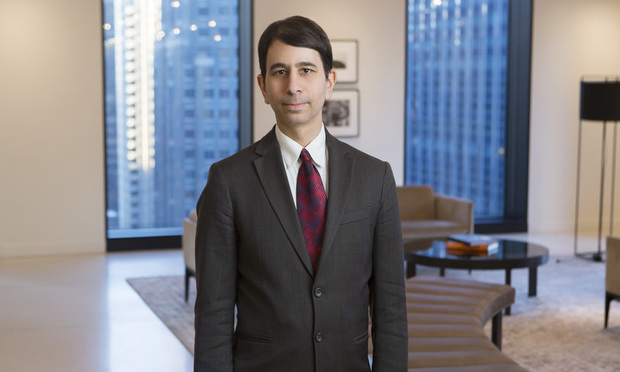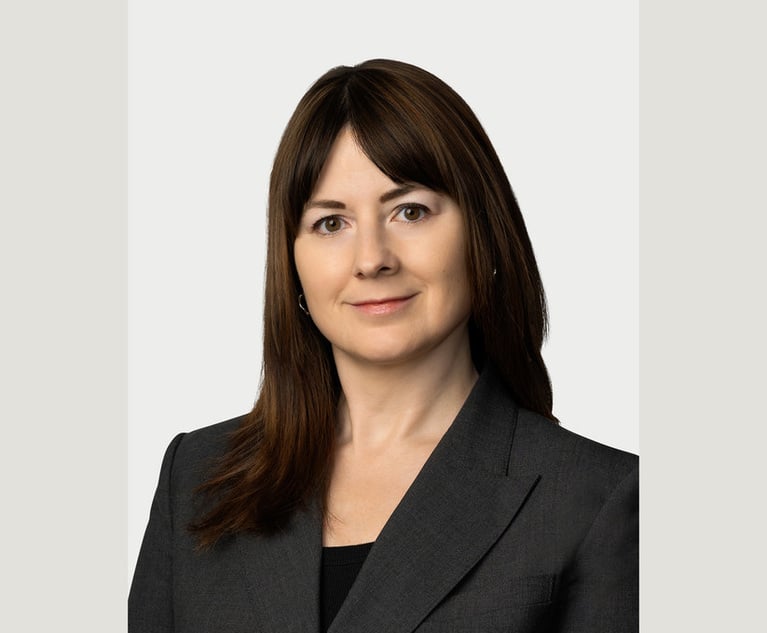Orrick, Herrington & Sutcliffe
Helping pro bono clients get closer to their own goals is deeply rewarding, personally and professionally.
April 30, 2019 at 11:59 PM
3 minute read
 Orrick Pro Bono Counsel Rene Kathawala.
Orrick Pro Bono Counsel Rene Kathawala.
Describe your firm's philosophy on pro bono service.
As Orrick partner Annette Hurst recently told AmLaw, pro bono legal service is in our DNA. Ninety-nine percent of our U.S. lawyers and 79 percent of our international lawyers met the 20-hour standard in 2018. Associates receive full bonus credit for pro bono hours; partners are expected to meet the minimum standard. All lawyers are encouraged to select projects of personal interest with the guidance of two full-time pro bono counsel.
Of the big cases your firm recently worked on, one included representing James Dimaya, a citizen of the Philippines who had been a lawful permanent resident of the U.S. for more than 25 years, but faced deportation. Tell us more about that case and how you reached the outcome.
When the case was set for re-argument after Justice [Neil] Gorsuch joined the [U.S. Supreme] Court, we focused on developing an innovative strategy to convince a conservative to provide the tie-breaking vote on our side.
Our appellate team scoured Justice Gorsuch's record as an appellate judge. We gleaned from his jurisprudence that he held significant concerns about Congress' enactment of vague laws that might give law enforcement and the courts too much latitude to fill in the gaps and make the hard decisions that Congress itself should have made. So we zeroed in on his "separation-of-powers" concerns at oral argument. Appealing to a conservative justice on what might appear to be the "liberal" side of a case was atypical—and it paid off.
What was the most satisfying aspect of that key case?
Hearing from all corners of the country what a difference this decision made in people's lives. It was a huge victory for our client, of course; he can now stay in the country that's been his home for decades. But the precedent we set has also meant that thousands of noncitizens have avoided automatic deportation, and many criminal defendants have avoided draconian sentencing enhancements.
Discuss other key pro bono matters recently completed by the firm.
Backing our arguments for Planned Parenthood, a federal judge struck down a Kentucky regulation that would have shuttered the state's last abortion clinic. In addition, prompted by our work, California leaders ordered new DNA testing in the case of death row inmate Kevin Cooper. In a separate matter, an Orrick team was instrumental in invalidating Washington state's death penalty law. We also secured two precedential Federal Circuit rulings expanding disability benefits for veterans in Saunders v. Wilkie and Procopio v. Wilkie. And more than 100 of our lawyers and staff collaborated on a comprehensive human rights report documenting persecution against the Rohingya Muslim minority in Myanmar.
Why does your pro bono work matter to you as a lawyer?
I am keenly aware there are people who are not nearly as fortunate as I am and need the kind of help I can provide through pro bono service. Social responsibility is important, both to me and the firm. Helping pro bono clients get closer to their own goals is deeply rewarding, personally and professionally.
Responses submitted by Rene Kathawala, pro bono counsel for Orrick; partners Josh Rosenkranz and Brian Goldman, who led the Dimaya case; and partner Karen Johnson-McKewan, lead attorney for Planned Parenthood in the Kentucky case.
This content has been archived. It is available through our partners, LexisNexis® and Bloomberg Law.
To view this content, please continue to their sites.
Not a Lexis Subscriber?
Subscribe Now
Not a Bloomberg Law Subscriber?
Subscribe Now
NOT FOR REPRINT
© 2025 ALM Global, LLC, All Rights Reserved. Request academic re-use from www.copyright.com. All other uses, submit a request to [email protected]. For more information visit Asset & Logo Licensing.
You Might Like
View All
GOP Now Holds FTC Gavel, but Dems Signal They'll Be a Rowdy Minority
6 minute read
‘Diminishing Returns’: Is the Superstar Supreme Court Lawyer Overvalued?

Trending Stories
Who Got The Work
J. Brugh Lower of Gibbons has entered an appearance for industrial equipment supplier Devco Corporation in a pending trademark infringement lawsuit. The suit, accusing the defendant of selling knock-off Graco products, was filed Dec. 18 in New Jersey District Court by Rivkin Radler on behalf of Graco Inc. and Graco Minnesota. The case, assigned to U.S. District Judge Zahid N. Quraishi, is 3:24-cv-11294, Graco Inc. et al v. Devco Corporation.
Who Got The Work
Rebecca Maller-Stein and Kent A. Yalowitz of Arnold & Porter Kaye Scholer have entered their appearances for Hanaco Venture Capital and its executives, Lior Prosor and David Frankel, in a pending securities lawsuit. The action, filed on Dec. 24 in New York Southern District Court by Zell, Aron & Co. on behalf of Goldeneye Advisors, accuses the defendants of negligently and fraudulently managing the plaintiff's $1 million investment. The case, assigned to U.S. District Judge Vernon S. Broderick, is 1:24-cv-09918, Goldeneye Advisors, LLC v. Hanaco Venture Capital, Ltd. et al.
Who Got The Work
Attorneys from A&O Shearman has stepped in as defense counsel for Toronto-Dominion Bank and other defendants in a pending securities class action. The suit, filed Dec. 11 in New York Southern District Court by Bleichmar Fonti & Auld, accuses the defendants of concealing the bank's 'pervasive' deficiencies in regards to its compliance with the Bank Secrecy Act and the quality of its anti-money laundering controls. The case, assigned to U.S. District Judge Arun Subramanian, is 1:24-cv-09445, Gonzalez v. The Toronto-Dominion Bank et al.
Who Got The Work
Crown Castle International, a Pennsylvania company providing shared communications infrastructure, has turned to Luke D. Wolf of Gordon Rees Scully Mansukhani to fend off a pending breach-of-contract lawsuit. The court action, filed Nov. 25 in Michigan Eastern District Court by Hooper Hathaway PC on behalf of The Town Residences LLC, accuses Crown Castle of failing to transfer approximately $30,000 in utility payments from T-Mobile in breach of a roof-top lease and assignment agreement. The case, assigned to U.S. District Judge Susan K. Declercq, is 2:24-cv-13131, The Town Residences LLC v. T-Mobile US, Inc. et al.
Who Got The Work
Wilfred P. Coronato and Daniel M. Schwartz of McCarter & English have stepped in as defense counsel to Electrolux Home Products Inc. in a pending product liability lawsuit. The court action, filed Nov. 26 in New York Eastern District Court by Poulos Lopiccolo PC and Nagel Rice LLP on behalf of David Stern, alleges that the defendant's refrigerators’ drawers and shelving repeatedly break and fall apart within months after purchase. The case, assigned to U.S. District Judge Joan M. Azrack, is 2:24-cv-08204, Stern v. Electrolux Home Products, Inc.
Featured Firms
Law Offices of Gary Martin Hays & Associates, P.C.
(470) 294-1674
Law Offices of Mark E. Salomone
(857) 444-6468
Smith & Hassler
(713) 739-1250









